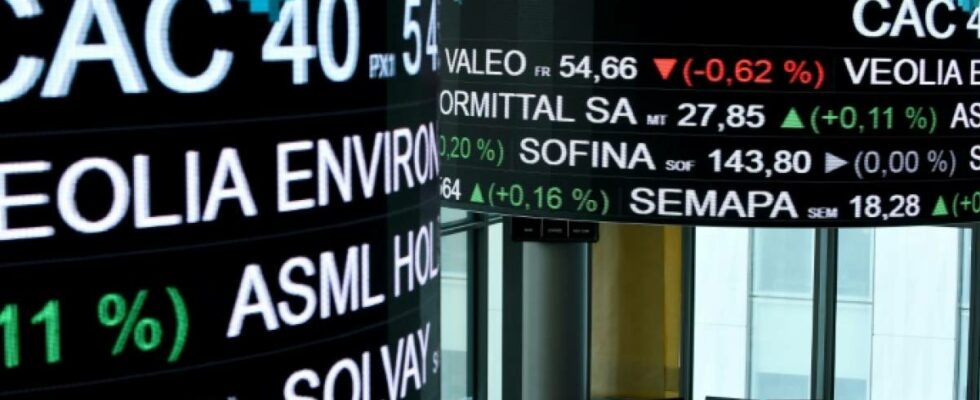The control room of Euronext, the company that manages the Paris Stock Exchange (AFP / ERIC PIERMONT)
The markets end under pressure a week where geopolitical tensions take over on Friday from fears about the consequences of higher-than-expected inflation in the United States.
In Europe, the indices started the day full of enthusiasm but once again, the trend at the end of the session was less glorious: Paris only rose by 0.34% around 1:45 p.m. GMT, Frankfurt by 0.44%.
London shone more: the only major European index to increase over the week, the FTSE 100 came close to its absolute record points at the start of the session, and gained another 1.38%.
The United Kingdom’s gross domestic product grew 0.1% month-on-month in February, strengthening hopes that the country will emerge from recession.
On Wall Street, after a surge of relief on Thursday with producer price data in March lower than expected, the indices started to fall again: the Dow Jones lost 0.65%, the S&P 500 0.61%, the Nasdaq 0.66%.
The week was marked on Wednesday by higher than expected inflation figures in the United States, making key rate cuts from the American Central Bank (Fed) less likely.
On Friday, rates started to fall significantly again, which may be a sign of investors’ search for security, ahead of a weekend fraught with geopolitical risks.
Israeli forces carried out new deadly raids on Friday in the Gaza Strip devastated by six months of war, amid fears of a response from Iran against Israel accused of a strike against the Iranian consulate in Damascus.
“As the rhetoric between the two opposing powers becomes more and more belligerent, the attraction of safe haven assets intensifies”, such as gold, government loans or even the dollar, “with investors preparing for conflict fraught with significant geopolitical and economic ramifications,” writes ActivTrades analyst Ricardo Evangelista.
In the United States, the 10-year rate was worth 4.51%, compared to 4.59% the day before, but this did not erase the rise in the previous days.
In Europe, the sharp declines in German rates (from 2.46% to 2.33%) and French rates (from 2.96% to 2.84%) allow them to erase their mid-week jump.
American banks without enthusiasm
On the equity side, the American bank JPMorgan Chase announced quarterly results on Friday that were better than expected by the market, but was cautious about the future due to inflation. The stock fell 3.74%.
The world’s leading asset manager BlackRock took 0.25%. Its results showed that it benefited from the progress of the markets in the first quarter. The company reached a record amount of assets under management and recorded a 36% jump in net profit.
The results of the Citigroup bank were marked by the significant increase in provisions on unpaid loans, even if turnover fell a little less than expected by analysts. The action gained 0.99%.
The euro at its lowest since November
The dollar climbed against the euro on Friday, to its highest level since November. The euro lost 0.85% around 1:30 p.m. GMT against the greenback at $1.0634.
Gold reached a new record on Friday, above $2,400 per ounce, and was still trading at $2,397.20 (+1.04%) around 1:30 p.m. GMT.
On the oil side, prices are supported by geopolitical risk, as investors fear disruptions to global supplies if the conflict between Israel and Hamas spreads to neighboring countries, particularly Iran.
The price of a barrel of Brent from the North Sea for delivery in June rose 2.18% to $91.70 and its American equivalent, West Texas Intermediate (WTI), rose 2.62% to $87.25.
Bitcoin fell 0.50% to $70,155.
